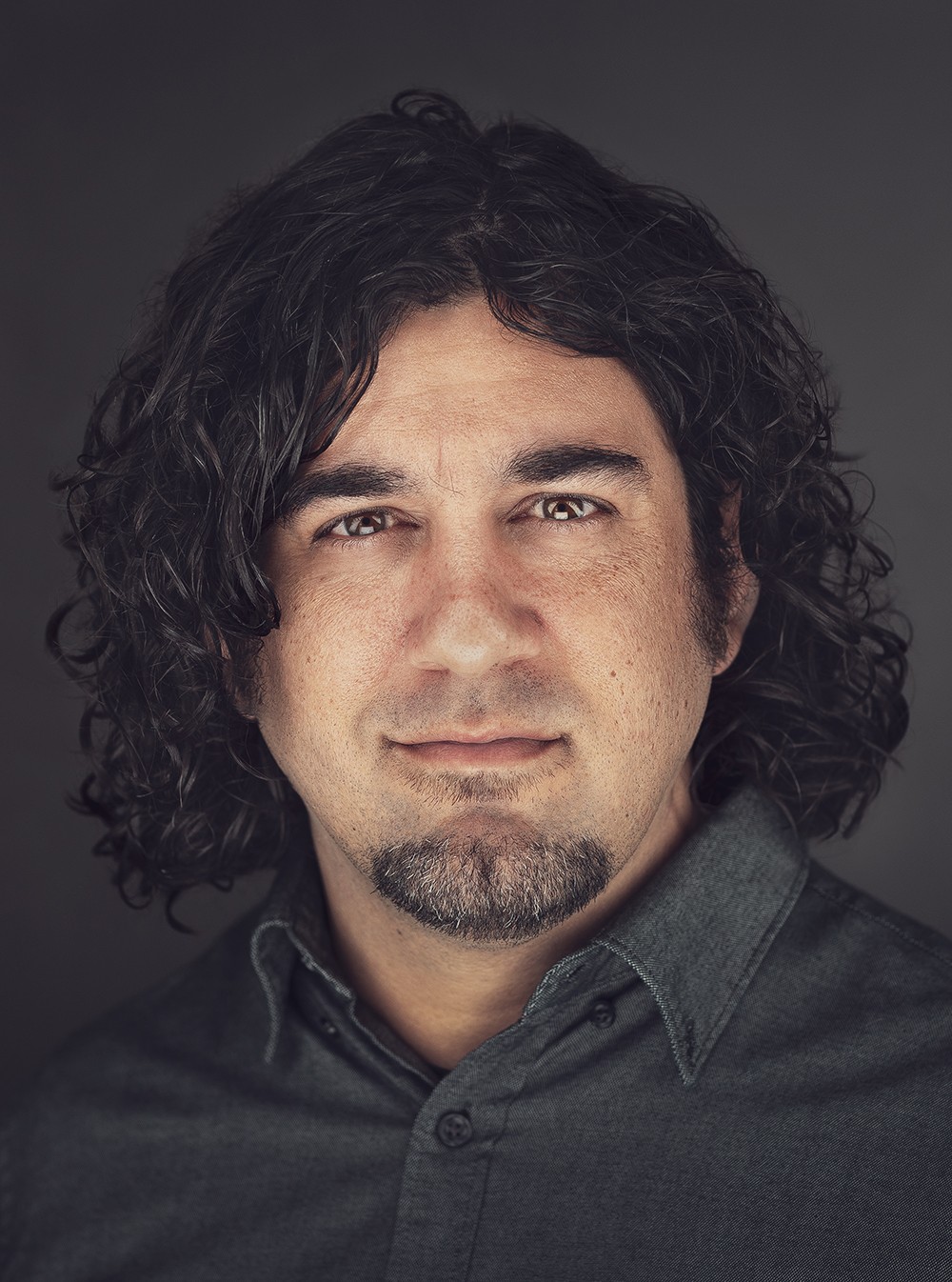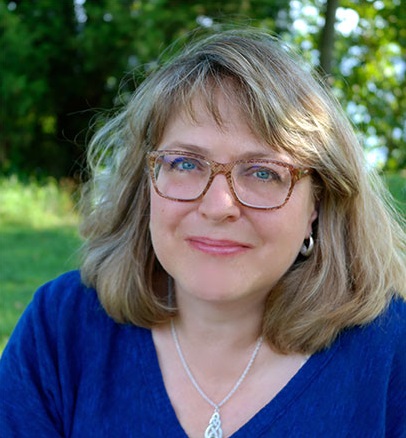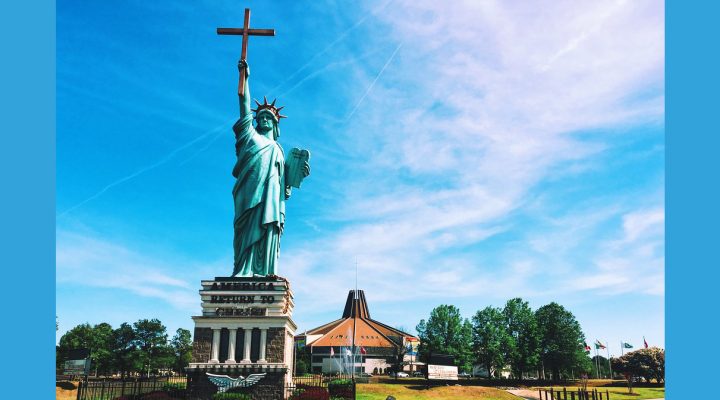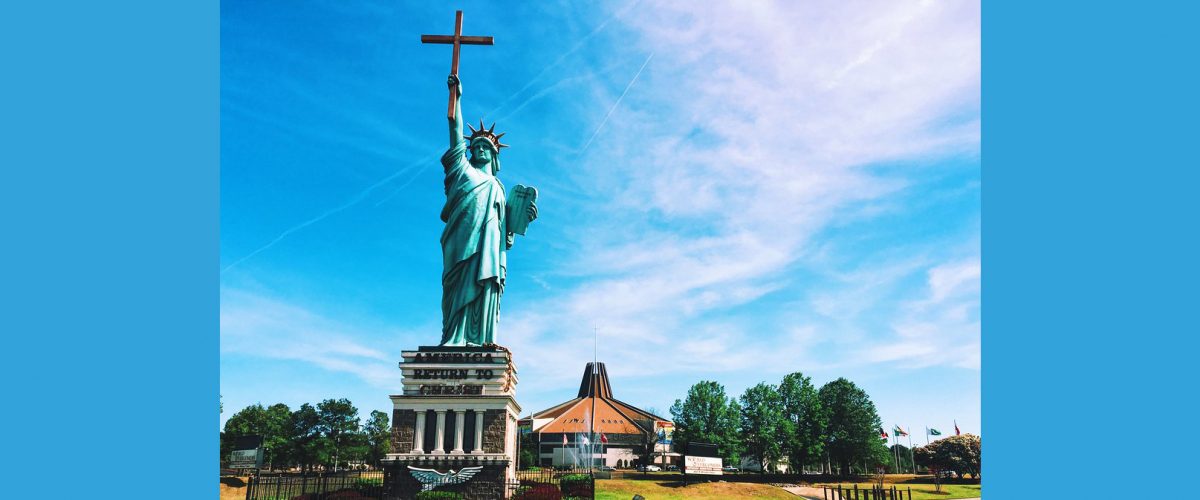Poll after poll and webinar after webinar lays out the data on white Christian nationalism. The facts of this threat to both democracy and faith are well-documented.
What’s missing from nearly every public discussion is the toxic theology that fuels white Christian nationalism. Behind the history, the sociology, the political realities, there is a theological problem.
Most of the experts speaking against white Christian nationalism today come from backgrounds other than theology. What they have to say is true and helpful, but it does not get to the root of the problem.

Rick Pidcock
This was illustrated in a recent webinar to release new polling data from Public Religion Research Institute about how white Christian nationalism is threatening American democracy. PRRI has been a leading source of research on this topic.
The Feb. 8 webinar was hosted by the Brookings Institution and featured a panel moderated by E.J. Dionne and comprised of the scholars Jemar Tisby, Peter Wehner, Kristin Du Mez and Robert P. Jones.
None of these experts are theologians by primary identity, and all come out of the evangelical tradition. That raised the concern of another prominent voice who was watching and tweeting throughout the webinar: Diana Butler Bass. She is an author and a historian of public theology.
“I’m in near despair that the critical narratives of white Xian nationalism (which is primarily a problem of white evangelicalism) are largely being controlled by writers & scholars who are themselves still evangelicals,” she tweeted.
“White evangelicals are mostly controlling the critique of the problem that their own theology has largely created.”
“No Jews on this panel talking about white Christian nationalism? No liberal Protestants w/o the conservative theological presuppositions of evangelicalism? Someone who is actually NOT religious? These alternative narratives have intellectual tools to speak to analysis of WCN. I realize that part of the problem is that Anthea Butler (who is a Catholic) isn’t there today. But honestly, white evangelicals are mostly controlling the critique of the problem that their own theology has largely created. … And so many of these ‘analyses’ wind up sounding like evangelism to the ‘right’ form of Christianity or apologetics.”

Diana Butler Bass
To be clear, Bass is not antagonistic toward PRRI or any of the panelists. She previously served on the board of PRRI. Instead, she said, her concern goes much deeper to include “the media’s overall engagement w/religion & politics, especially on this subject.”
Writing for Religion Dispatches the day after the webinar, scholar Chrissy Stroop agreed with Bass: “American evangelicals are socialized via homeschooling, Christian schools, churches and the subculture in general to apply the Bible and Christian teachings to every aspect of their lives. That includes attempting to implement a theocratic policy agenda, so that our nation might be ‘blessed’ for its ‘obedience to God’s authority. It’s been frustrating watching pundits actively struggle not to understand this over the last few years.”
Pure Christianity is this
The panel discussion began with Tisby, a historian, defining Christian nationalism as an “ethnocultural ideology that uses Christian symbolism to create a permission structure for the acquisition of political power and social control.”
By calling it an “ethnocultural ideology” that “uses Christian symbolism,” he was distancing Christian nationalism from the pure Christianity he believes in.
He also called white Christian nationalism “the greatest threat to democracy and the witness of the church in the United States today.”
“It would be hard to find a figure in human history less likely to be a Christian nationalist than Jesus.”
Wehner, a political writer and pundit, declared: “It would be hard to find a figure in human history less likely to be a Christian nationalist than Jesus. I just think the cognitive dissonance of that is tremendously powerful.
“To see him invoked or his movement invoked or those who claim to follow his name to use Christian nationalism in the way they do is puzzling and in many ways horrifying, and I’m saying that as a person of the Christian faith.”
Then he got close to the theological question but not enough. He said the presence of Christian nationalism is due to a “failure of catechesis” or basic teaching about the faith.
He quoted Russell Moore, editor in chief of Christianity Today, whom he said “talks about Jesus as a hood ornament. And I think what’s happened. … (White Christian nationalists) would say that Christianity, following Jesus is the most important thing in their life. I think in practice it’s not. And I think that a lot of people are blind to it.”
Instead, Wehner concluded, “culture, sociology, politics, partisanship is the thing that’s driving a lot of people’s views. And faith is subordinate to that. And then people prooftext the Bible to affirm what they already believe.”
“Once again, the problem is clearly documented, but the why remained unaddressed.”
Du Mez, a professor of history and gender studies, brought up a conversation she had with a non-Christian reporter who asked her: “I just have one question I can’t quite parse out. I am not a Christian. But I’ve read the Christian Bible. And I don’t understand what’s Christian about this because when I look at the teachings of Jesus Christ, I don’t see how it logically follows these positions.”
Once again, the problem is clearly documented, but the why remained unaddressed.
At this point, Diana Butler Bass was about to blow a gasket.
An extension of theology
“I am going to scream if I hear one more anti-WCN evangelical talking about WCN. It always winds up sounding like public therapy or apologetics,” Bass tweeted. “Although no one said it at the PRRI/Brookings event today, their research points toward a conclusion that few want to recognize: White Christian nationalism isn’t an aberration. It is the logical extension of a certain — and dominant — form of American evangelicalism.”
The PRRI data being discussed prove the point: The problem isn’t due to people who aren’t true Christians that have a disconnection from theology; the problem of white Christian nationalism flows from the most committed Christians.
Bass continued: “Watching the roll-out of PRRI’s Xian Nationalism survey. They just blew the ‘Xian Nationalists don’t attend church’ myth out of the water. Xian Nationalists are more likely to be regular churchgoers (overwhelmingly white evangelical congregations).”
Therefore, to Bass, white Christian nationalism “is a purposeful set of beliefs and practices promoted by intellectual and theological leaders for specific political ends and power. Their catechesis is EXACTLY as intended, EXACTLY as they learned and embraced in seminary and institutions.”
What’s needed, she said, is conversion, “a complete metanoia, a turning away from a worldview based on an inherent hierarchy of privilege and patriarchy.”
What’s going on in churches?
Thankfully, someone else in the room noticed how theologies of power were being disconnected from the fruit of sacralized political power.
Amanda Tyler, executive director of Baptist Joint Committee for Religious Liberty, was present in the audience and mentioned, “I think that begs the question about what’s going on in our churches and how much of it is Christianity, how much of it is Christian nationalism.”
Tyler leads an advocacy group called Christians Against Christian Nationalism. She pointed to a reality beyond the polling, beyond the historical interpretation by asking: What’s being taught in churches today?
We need to have more than an academic conversation about history and culture. We need a conversation about what it means to be a Christian, which is inherently a theological conversation.
Du Mez acknowledged Wehner’s earlier use of the term “catechesis” and said they also could speak of “indoctrination, grooming if you will, or discipleship.” Those are theological concepts.
“People who think they’re Christians, who claim the Christian faith, are from the grassroots up inculcating this, articulating this, and reinforcing it.”
As a historian, she said, “this is not ultimately a story of politics hijacking religion. … We can make claims about you got Christianity wrong, but people who think they’re Christians, who claim the Christian faith, are from the grassroots up inculcating this, articulating this, and reinforcing it.”
Evangelicals stand alone
Based on the polling data, “white evangelical Protestants really do stand alone,” Jones explained. “There’s no other religious group in the country that’s anywhere near.”
PRRI’s latest survey found two-thirds of white evangelicals could be classified as either adherents or sympathizers of Christian nationalism.
Across white, Hispanic and Black communities, identifying as a “born again” evangelical means respondents are five times as likely to ascribe to Christian nationalism compared with those who identify as Christian but not evangelical.
PRRI found gaps of 20 to 50 points between white Christian nationalists and Americans in general on key questions, such as denying the problem of racism, considering immigrants to be invaders, wanting to prevent immigration from Muslim nations, thinking Jewish people are too powerful, and promoting patriarchal gender roles.
PRRI also found evangelicals lead the nation in the desire to make things right through violence; 40% believe they “may have to resort to violence in order to save our country.”
Once again, this belies a theological problem.
The most dominant forms of evangelical Christianity teach that God has set up hierarchies of authority and power with men in charge. They believe these power dynamics are built into the gospel itself.
“The problem is a theology that includes structural violence against the dignity of those at the bottom of the hierarchy.”
Thus, when PRRI shows white Christian nationalists have a bent toward patriarchal gender roles, the problem is a theology that includes structural violence against the dignity of those at the bottom of the hierarchy. At its core, evangelicalism believes everything is made right through violence. Even God makes things right through the violence of the Cross and the satisfaction of God’s wrath, they teach.
There have been many manifestations of this theological error — including support for slavery, as Jones pointed out — but the real problem is that the church has spent centuries theologically controlling people to interpret reality as hierarchies of power and to celebrate the solution to broken hierarchy as violence.
Pure Christianity?
The fundamental assumption of evangelicalism is that there is a pure Christianity that must be protected through sacralizing structures of privilege and wielding power over others. White Christian nationalism — like the theology that drives it — is first and foremost about maintaining power.
Sometimes, progressive evangelicals attempt to distinguish Christian nationalism from pure Christianity. White Christian nationalists are being guided by a corrupted iteration of pure Christianity, they assume.
But the problem is more serious than that. White Christian nationalism is built on a theological foundation that is cracked and unstable. It is corrupt at its base, not just in some of its parts. And as long as this theology remains intact and celebrated, its infection will continue to spread.
There is no “pure” Christianity. Instead, Christianity is an evolving, enculturated living out of whatever its communities interpret to be good news in the tradition of Jesus.
Historians, sociologists and journalists play important roles in examining the evangelical structures of privilege and power that are harming our democracy. But theologians and non-Christians must be invited to the conversation.
The root of the problem — the source of white Christian nationalism — is theological more than cultural. Diana Butler Bass is right: Not enough of us are talking about that.
Rick Pidcock is a 2004 graduate of Bob Jones University, with a Bachelor of Arts degree in Bible. He’s a freelance writer based in South Carolina and a former Clemons Fellow with BNG. He recently completed a Master of Arts degree in worship from Northern Seminary. He is a stay-at-home father of five children and produces music under the artist name Provoke Wonder. Follow his blog at www.rickpidcock.com.
Related articles:
Amanda Tyler testifies before Congress against Christian nationalism
Christian fragility, brittleness and white Christian nationalism | Opinion by Susan Shaw
Christian nationalism provides cover for white supremacy, BJC leader says
PRRI’s Structural Racism Index attempts to quantify racist beliefs
PRRI’s new national survey shows chasm between Americans growing wider


